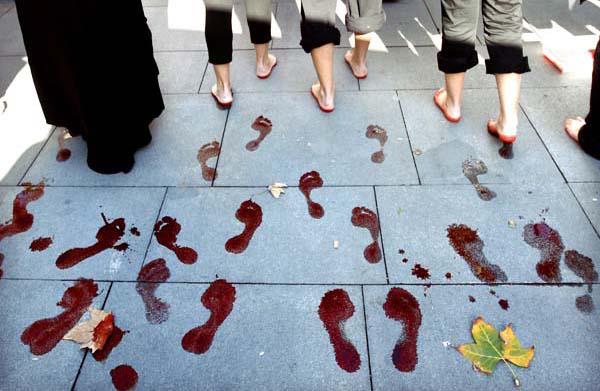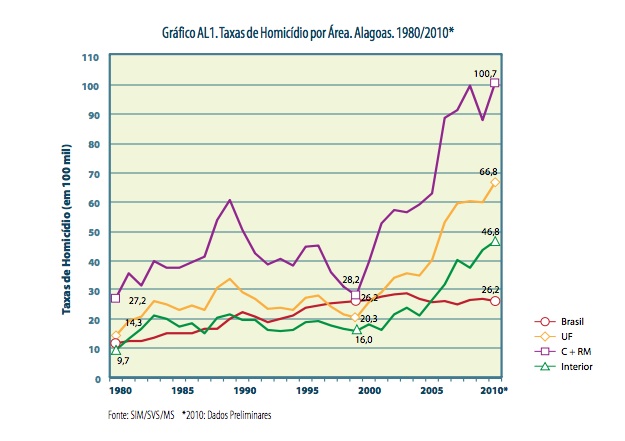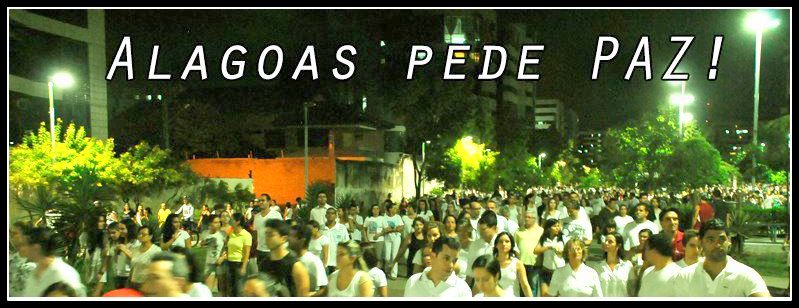As I write this post, I read a piece of news [pt] about a teenager who was shot dead on the city streets of Maceio, Brazil, on the night of Tuesday May 29, 2012, while at least three other bodies of victims of violence were received at the capital's institute of forensic medicine. Just a few hours before these recent crimes, thousands of people – mobilised through social networks – took the streets in the “Walk for Peace”, an appeal to end violence in the city's coastal state of Alagoas.
For a long time the population of Alagoas has become indignant by the trivialisation of life and the growing number of murders for trivial reasons [pt]. The last straw causing the mobilisation was the assassination of 67-year-old doctor José Alfredo Vasco Tenorio on the afternoon of May 26, following an armed robbery. In the same weekend alone, 17 other people came to violent deaths in Alagoas.

The floor where the doctor was murdered was stained with 'blood' footprints. Photo published in Facebook by Del Valle Allves.
The untenable insecurity of the situation led people to protest on the streets in a demonstration organised through the Facebook group Alagoas – Estado de Emergência (Alagoas – State of Emergency) [pt]. After the protest on Monday evening, Silvana Chamusca [pt] provided a summary of the event, with an overview of the debate that followed the peaceful walk “whose single goal was to show our indignation, without looking at social class”:
Participamos de um primeiro movimento, poderão ser organizados outros, então sugira, tenha iniciativa, levante dados, organize no seu bairro, ou em qualquer outro bairro, que garanto que eu estarei lá.
The group, which was created on Monday, has already over 60,000 members. While a new protest is being organised for June 5, Toninho Cajueiro [pt] asks:
O que foi conseguido de CONCRETO após a caminhada? Quais as providências que serão tomadas após este evento? A verdade é que a grande mobilização que precisamos fazer é na URNA, na ELEIÇÃO deste ANO, escolhendo de forma CORRETA e SEM INTERESSE os nossos políticos. Com educação de qualidade e geração de emprego se muda esse Estado.
While mobilising again, people engaged in a lively debate about the roots of violence, social class conflict, politics and the general feeling of the population. Mauricio Carvalho [pt] believes violence is a very complex issue and should not be treated with a simplistic view:
A morte do Dr. Alfredo serviu de estopim, um símbolo, um mártir, aquele que nós esperamos que tenha sido a última vítima dessa violência desenfreada. Ninguém é cego, todo mundo sabe da situação caótica que Alagoas chegou, a reclamação era unânime. Ninguém é insensível ao ponto de quantificar a importância da morte de uma pessoa independentemente do lugar do planeta que ela resida ou sua classe social.

"It is not enough to speak – you must get out of your home". Artwork published by Fabrício França de Oliveira in the Alagoas, Estado de Emergência group.
Eulália Lima [pt], although living in another state, followed the debate closely, saying it was high time social networks were used “for something indeed useful”:
Que sigamos bem mais longe, pelo simples fato de que o pouco que fizermos já significará um passo enorme para um Estado e um povo tão castigado. Aprender a usar o voto e a importância dele, saber que tem direitos, lutar por eles e deixar o egoísmo e o conformismo para trás, pode transformar o mundo. O ALAGOAS – ESTADO DE EMERGÊNCIA é um exemplo disso. Sair do sofá e interagir pode render gratas recompensas. Estou nessa! Parabéns a todos pelo primeiro passo!
A petition demanding immediate intervention from the Public Ministry [pt] in the state was launched on Tuesday 29, and has already gathered over 2,000 signatures. After adding his name to it, Nilton Resende [pt] asked, “What intervention do we want? What intervention do we need?”:
Os vereadores aumentaram seus salários e nós não pedimos uma intervenção. Nós somos vilipendiados constantemente pela corja de políticos que diz nos representar, e não pedimos intervenção.
Mas, queremos uma intervenção sobre os bandidos – os bandidos pobres, que matam num átimo. Pedimos essa intervenção, sem nos lembrarmos dos bandidos que nos matam lentamente há décadas.
É preciso uma mudança geral. Não adianta uma intervenção apenas repressora sem mudar a base causadora do estado de penúria de nosso Estado. Sem nos tirar da tortura constante a que somos submetidos, como eu disse no post anterior: .
Passeemos por outros estados brasileiros, e veremos as UPA’s – Unidades de Pronto Atendimento. Quais foram construídas em Alagoas? Quais foram construídas em Maceió? E onde está o dinheiro que foi destinado a isso?
Na verdade, precisamos de diversas intervenções.
Local councilors have raised their salaries and we did not ask for intervention. We have been constantly vilified by the gang of politicians who are said to represent us, and we do not ask for intervention.
But we ask for intervention when it is about the bad guys – the criminals in poverty, who kill in an instant. We ask for intervention, without remembering the bad guys who have been killing us slowly for decades.
We need an overall change. There is no use for just a repressive intervention without changing the basic cause of the penury of our State; without taking us away from the constant torture that we are subjected to, as I said in a previous post: Torture: Tortures [pt].
If we go to other Brazilian states, we see Emergency Care Units [a type of medium complexity hospital deployed in several Brazilian cities]. Where are they in Alagoas? Where are they in Maceio? And where is the money that was allocated for that?
In fact, we need different interventions.
Vertiginous growth

Graphic of the 2012 Map of Violence showing the growth rates of homicide in Alagoas in the last 20 years. The red color indicates the national index, pink covers Maceió and metropolitan area, and Alagoas as a whole is shown in yellow.
Crime in Alagoas has shown an accelerated and continued growth, according to the 2012 Map of Violence [pt], published by the Instituto Sangari. In the 1999 report, the state boasted a moderate level of violence, with a rate of 20.3 homicides per 100,000 inhabitants (below the national average of 26.2) and ranking 11th.
In 2010, the rate of 66.8 homicides per 100,000 secured Alagoas the title of the most violent State in the country for the fifth consecutive year. While the average Brazilian rates of violence remain unchanged, Alagoas’ grew 228.3%, more than tripling in the last 10 years.
Despite these calamitous rates, the small state does not make the headlines in the country's mainstream media. Thallysson Alves [pt] demands the due attention:
Pessoal, já que a imprensa nacional não vem a nós, vamos a ela. Enviem links que relatam a mobilização para os sites, jornais, TVs, revistas e rádios de fora do nosso Estado. Quem conhecer jornalistas de fora, adicionem ao grupo, informe. Vamos pressionar de todos os lados para que, enfim, sejamos ouvidos.
The people of Alagoas are tired and want peace. Kika Chroniaris [pt] suggests a way to show this:
Coloquem fita branca em seu carro e uma faixa na fachada de seu estabelecimento ou casa. Seja em qualquer lugar da cidade, precisamos mostrar que a cidade toda clama por PAZ.







